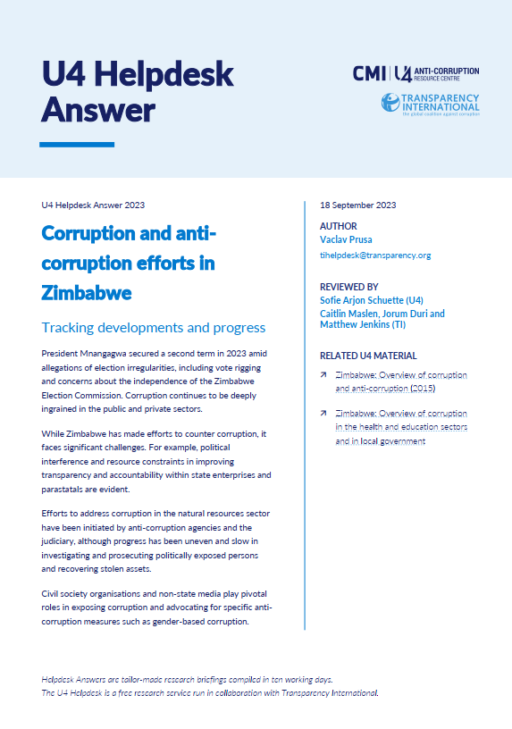
This Anti-Corruption Helpdesk brief was produced in response to a query from a U4 Partner Agency. The U4 Helpdesk is operated by Transparency International in collaboration with the U4 Anti-Corruption Resource Centre based at the Chr. Michelsen Institute.
Query
Please provide an overview of the prevalence, type, and nature of corruption risks in Zimbabwe.
Summary
President Mnangagwa secured a second term in 2023 amid allegations of election irregularities, including vote rigging and concerns about the independence of the Zimbabwe Election Commission. Corruption continues to be deeply ingrained in the public and private sectors.
While Zimbabwe has made efforts to counter corruption, it faces significant challenges. For example, political interference and resource constraints in improving transparency and accountability within state enterprises and parastatals are evident.
Efforts to address corruption in the natural resources sector have been initiated by anti-corruption agencies and the judiciary, although progress has been uneven and slow in investigating and prosecuting politically exposed persons and recovering stolen assets.
Civil society organisations and non-state media play pivotal roles in exposing corruption and advocating for specific anti-corruption measures such as gender-based corruption.
Main points
- While there were high hopes for reform when Emmerson Mnangagwa took office in 2017 following Robert Mugabe's rule, the country still grapples with enduring issues such a high incidence of corruption, economic challenges and human rights abuses.
- Multiple types of corruption permeate Zimbabwe's society, affecting the public and private sectors, including vital institutions like the judiciary, law enforcement, media, electoral bodies and the mining industry.
- There is a gendered component to corruption in Zimbabwe, as there is evidence that women's rights are disproportionately affected by the need to offer bribes when accessing essential public services.
- The international dimension of corruption is significant in Zimbabwe as illicit financial flows (IFFs) have drained billions of dollars from the country, particularly in sectors related to natural resources like mining, timber and wildlife. Many of the IFF proceeds are linked to corruption.
- Civic space and independent reporting have come under growing strain in the country. This is exemplified by the introduction of the Patriot Act in 2023, which grants broad powers to the government to suppress dissent and could hinder investigative journalism into alleged corruption.
Contents
- Overview of corruption in Zimbabwe
- Background and political context
- Extent and types of corruption
- Main sectors and areas affected by corruption
- Legal and institutional anti-corruption framework
- Legal framework
- Institutional framework
- Other stakeholders
- Media
- Civil society
- Anti-corruption CSOs active in Zimbabwe
- References
Caveat
The information presented in this brief is derived primarily from publicly available sources. As such, the completeness and accuracy of the data are subject to the extent of information available. Certain anti-corruption activities or initiatives, particularly those not extensively covered online, may not be adequately represented in this research. A comprehensive understanding of corruption in Zimbabwe may require a more in-depth analysis of the dynamic national political context and evolving international corruption networks with links to Zimbabwe.
Authors
Vaclav Prusa, [email protected]
Reviewers
Sofie Arjon Schuette (U4)
Caitlin Maslen, Jorum Duri and Matthew Jenkins (TI)
Date
30/10/2023
Tags
 Download PDF
Download PDF
